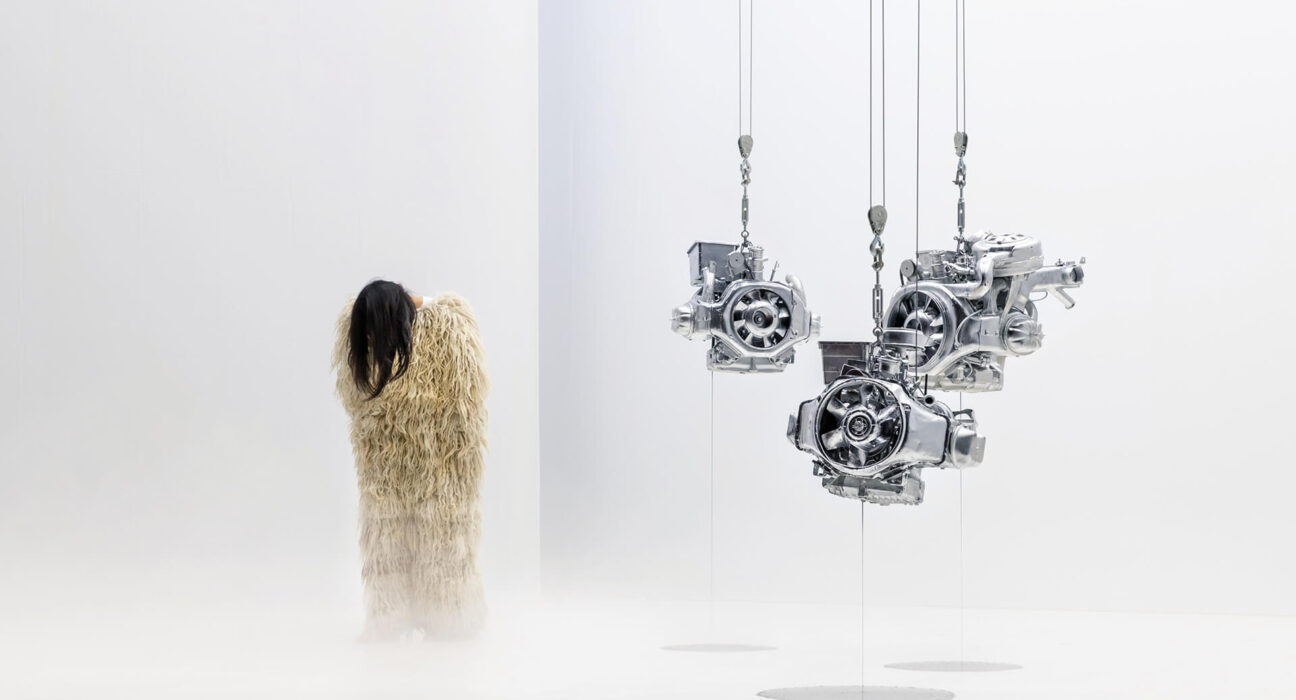The French artist Franck Vigroux wears many hats—he works with music composition, stage design, experimental sound and visual art, and has been practising for over 20 years. He introduces himself, and his craft, telling STIR, “I live in France and make music and theatre; my work integrates video art, light art and bodies with movement. I try to create new performance formats and strong physical and audiovisual art experiences. Religion, oppression, authoritarianism and class inequality are some of the topics that I have been particularly interested in these last few years. I can add that, globally, my theatrical work can’t be qualified but is more open to the imagination, with a big shot of strangeness, and that it also seeks to create a sort of dialogue between archaism and modernity.” Besides these pursuits, the artist also composes and plays music that falls under a variety of genres, from abstract experimentation to more “traditional” electronic styles.
Vigroux is a veteran of the electronic music and experimental audiovisual art scenes in Europe, and the French musician and composer began his creative journey in earnest as an experimental filmmaker over two decades ago. He mentions that music composition and image making have always fascinated him, so much so that he found himself compelled to practise these despite not having pursued higher education studies, within the arts or otherwise. “I come from the working class and have been a construction worker in my youth. I started to work within the performing art scene, with theatre directors and choreographers, and I immediately saw the potential for my music to be connected with these different mediums. Also, I never considered myself to be a talented musician but at least capable enough to make a track to go with other art forms,” he says. With a touch of humour, Vigroux adds, “Don’t you think that modesty is virtuous?”
Vigroux is grateful for the artists that he has collaborated with over the decades, especially over the last few years. These practitioners include members of the visual artist and lighting designer communities, dancers and others, and the artist has also created his own production company to further his experimentation and collaboration across sound art, light art and video art. He wishes to see more multisensory elements enter the music and concert space but explains that there are logistical and financial considerations to be made that go above and beyond the artistic ambitions of individual performers. Vigroux tells STIR, “This requires important production resources, which are not easy to access in the music scene.”
A few years ago, the artist saw a large and complex audiovisual performance art production at a theatre festival that he found to be quite original and exciting. Vigroux looks back, saying, “The show was only machines, music, a mechanical piano, moving objects, light and water, which was something unique, and it was also completely designed by a musician.” The artist is a proponent of multisensory elements entering the world of music but tells STIR that this is, unfortunately, extremely rare. “I sometimes regret that most musicians are so isolated from the performing arts, but it’s like that,” he says.
When asked about the technologies deployed in some of his recent projects, Vigroux tells STIR that he does not dwell too hard on technological matters and admits that he has a proficient entourage of technicians and artists to aid him in his endeavours. The artist thinks through image and scenography before any technological experimentation takes place, which he expands on, saying: “It is only instruments in the end, and I am not a geek at all. However, I do know the specifications and possibilities of the equipment, which is usually enough to think and create imagery and scenography.”
For three recent projects titled Flesh, Forêt and Chutes, the artist has attempted to create a visual language through the use of light, video and costume design, among other facets of multimedia art. Vigroux’s team used commonly available tools such as video projectors, transparent screens, LED screens, smoke machines and moving lights. The artist discusses his approach with STIR, “The way we set up and the idea of creating three-dimensional spaces with hanging elements, optical illusions and animation; these are all parts of what drives us through the process of creation.”
One wonders how the artificial intelligence (AI), augmented reality (AR) and virtual reality (VR) technology booms will affect practices such as Vigroux’s. When asked what direction he sees work such as his moving in due to these developing technologies, he responds: “It’s almost a question for a futurologist!” Vigroux limits his expectations and points out that most artists, including himself, do not have the resources to invest in cutting-edge technology and are more acclimatised to a process of recycling time-tested instruments. He tells STIR: “Nobody wants to miss the train and it’s certainly all very trendy, but I don’t think there will be anything revolutionary within the next year. It’s a slow process; let’s let time do its work.”
The multimedia artist explains that he could use AI art to generate imagery, as many do, and could even extend this further to music as well, but he is more drawn to analogue sounds. Virtual reality and augmented reality within new media haven’t impressed him much at all and therefore he has little interest in those particular facets of cutting-edge technology. For his part, Vigroux is currently on hiatus from performing, but has several works on tour. In the meantime, he is working in collaboration with the video artist Kurt d’Haeseleer and is composing the music for a new 3D concert. Additionally, he is working on a concept titled Nacht, which “is a night event and electronic opera in three acts, with two audiovisual concerts and an audiovisual installation.” His comrades in this endeavour are Antoine Schmitt, who is creating generative video art, and Loïc Varanguien de Villepin who sings in countertenor.


